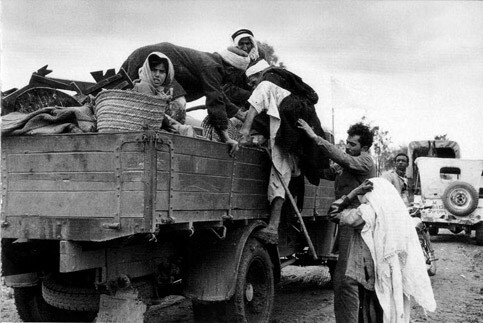Al Jazeera 16 May 2005

Palestinian families forced to leave the village of Faluja in 1948. The village was ethnically cleansed by Jewish forces. On its looted lands, Israeli settlers founded Qiryat Gat in 1954. (UN Photo)
Palestinians have observed the blackest day in their history with warnings that there will be no Middle East peace until they get independence and the plight of their refugees is solved. Millions of Palestinians at home and in the diaspora on Sunday commemorated the 57th anniversary of the Nakba (catastrophe). The term denotes the loss of Palestine to Zionism, the creation of Israel and the expulsion of most of the Palestinian people from their historical homeland.
Palestinian President Mahmoud Abbas said regional stability was dependent on a just solution. “Peace, stability and security in the Middle East can only be achieved with a just solution to our cause, based on the international resolutions, which stress our people’s right to an independent state with Jerusalem as its capital,” Abbas said in comments broadcast by Palestinian media.
Sombre anniversary
Sirens were sounded throughout the West Bank and Gaza Strip, and Palestinians were asked to stand silent for a minute in memory of the anniversary. Marches and rallies were organised throughout the occupied Palestinian territories, with speakers reasserting commitment to the right of return.
Children, many of them descendants of the estimated 750,000 refugees forced to leave by Jewish forces in 1948, carried large keys symbolising their right of return to former homes and villages in what is now Israel. These homes have been destroyed by the Israeli authorities or are inhabited by Jewish immigrants from around the world.
“Before she passed away, my grandmother gave us the key to her house, so that we will never forget where we came from, and so that one day we can return to it,” said 40-year-old Imad Abu Ahmad in the Gaza Strip, whose family fled from the village of Brair just outside of the Gaza Strip, near al-Majdal.
Right of return
In 1948, Israel nearly destroyed 475 Palestinian towns and villages with the intention of burying Palestinian history. However, Palestinian yearning to return to their former homes is strong despite the passage of 57 years. “This is the key to our home in Falluja. I won’t give up my right to return to my home and my villages,” said Ahmad Titi, a third-generation refugee, now living at the Fawwar refugee camp, 10km southwest of Hebron. “Even if they give us a state in the West Bank and Gaza Strip, we won’t give up the right of return,” he said.
Just solution
The Palestinian Authority (PA) continues to publicly affirm its commitment to the right of return according to UN resolution 194, which calls for the repatriation of the refugees. PA Prime Minister Ahmed Qurei, in a speech marking the anniversary, said: ”We shall not give up the right of return, and will continue to demand a just solution for refugees’ plight.”
However, PA leaders privately recognise that the full implementation of the right of return is virtually impossible, given Israel’s vehement rejection of it and US backing of the Israeli stance.
Silent protest
In the Gaza Strip, deaf and mute girls and boys from the Jabaliya rehabilitation centre demonstrated. “We are here today because Jews took over our land and our homes in Palestine 57 years ago, and today we mark this day,” explained 15-year-old Sabrin Buri in sign language, while holding up a sign identifying the village from which her parents were forced to flee, its population and its size. “We are very sad, but nevertheless, we have faith we will return to our homes one day.”
Miriam Um Samir, 61, who fled with her family from their village of Yibna near Yafa at the age of four, said: “I have faith that one day we will return. No one has a right to negotiate our right to return to our homes. The right of return is not for sale.”
Political suicide
US President George Bush last year pledged that the US would oppose Palestinian demands for the repatriation of the refugees to their original hometowns in what is now Israel. Some Palestinian leaders think the refugees’ plight should not be linked to statehood.
“The refugees’ problem should be considered on its own merits; it has nothing to do with the West Bank and Gaza Strip. Those people deserve to return to their original homes,” said Azmi Shuaibi, a Palestinian legislator and former minister.
Speaking to Aljazeera.net on Sunday, Shuaibi said the younger Palestinian generations were more committed to the right of return than the older generations. “It would be very, very difficult for any Palestinian government or leader to abandon the right of return. This is political suicide for any politician who dares say no.” Shuaibi said the creation of a viable state on the West Bank, East Jerusalem and Gaza would alleviate the refugees’ ordeal. “But it won’t end the problem completely,” he said.
Laila El-Haddad in the Gaza Strip contributed to this story. Khalid Amayreh is a journalist based in the occupied West Bank. This article was originally published by aljazeera.net and reprinted on EI with permission.
Related Links





